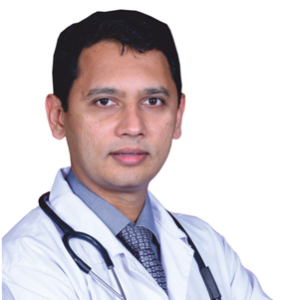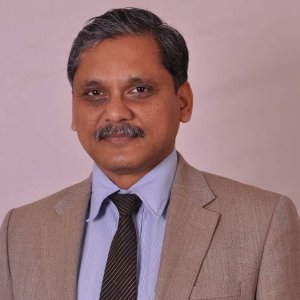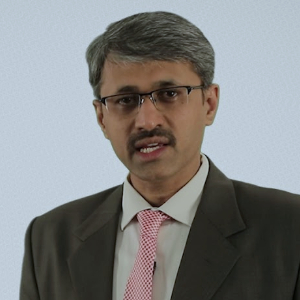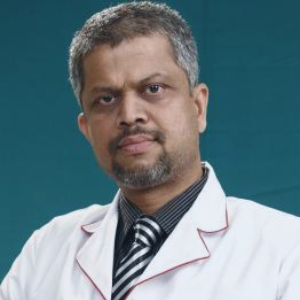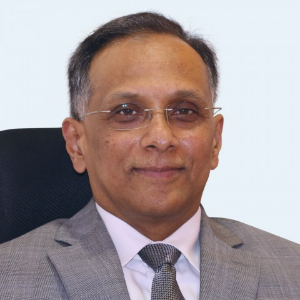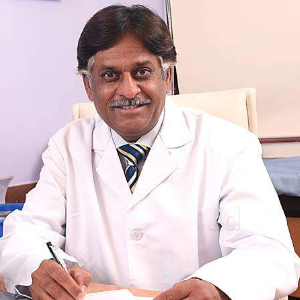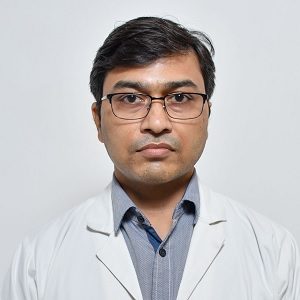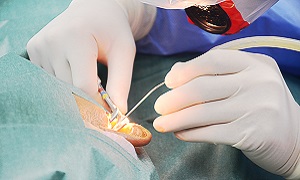Best Doctors in India for Acoustic Neuroma Treatment
- Neurosurgeon, Bengaluru, India
- Over 22 years’ experience
- Gleneagles Global Hospital Bengaluru
Profile Highlights:
- Dr. Madhusudan H V is an expert Neurosurgeon in South India with 22+ years of experience in neuro and spine surgery.
- With a specialization in minimally invasive neurosurgeries, Dr. Madhusudan holds the credit for more than 7000 neurosurgeries. He also finds interest in endoscopic interventions and frameless navigations.
- Neurosurgeon & Spine Surgeon, Bengaluru, India
- Over 20 years’ experience
- Fortis Hospital Banerghatta Bengaluru
Profile Highlights:
- Dr. Prahraj S S is a leading Neurosurgeon who specializes in all types of neurological surgeries and has performed over 6000 neurosurgeries till date along with complex cranial and spine surgeries.
- He is one of the most renowned neurosurgeons in the country and has provided his services to some of the premier medical institutes in India such as NIMHANS where he performed a large number of spinal surgeries.
- Neurosurgeon & Spine Surgeon, Bengaluru, India
- Over 15 years’ experience
- Gleneagles Global Hospital Bengaluru
Profile Highlights:
- Dr. Praveen K S is a highly qualified neurosurgeon with over a decade of experience in handling all kinds of neurological diseases and disorders.
- He specializes in Pediatric Neurosurgery, Neuro-Oncology, Endoscopic neurosurgery, Aneurysms, and Neuro- Trauma and has performed over 4000 neurosurgeries in his career.
- Neurosurgeon & Spine Surgeon, Mumbai, India
- Over 20 years’ experience
- Wockhardt Hospital Mumbai
Profile Highlights:
- Dr. Rahul Modgi is a highly established neuro and spine surgeon in Mumbai specializing in all types of brain and spine surgeries.
- Dr. Rahul Modgi’s name has been recorded in the Limca Book of Records in 2014 when he removed the heaviest iron rod from the brain of a 17-year-old patient. He has also performed various other risky surgeries for which he has greatly appreciated.
- Neurosurgeon, Bengaluru, India
- Over 30 years’ experience
- Fortis Hospital Banerghatta Bengaluru
Profile Highlights:
- Dr. Rajakumar V Deshpande is a renowned Neurosurgeon in Bengaluru. He performed the first pedicle screw fixation surgery for a spine injury in Bangalore.
- Dr. D V Rajakumar specializes in endoscopic neurosurgeries and has performed some of the most complex brain and spine surgeries through the endoscopic approach. His other areas of interest include minimally invasive neuro surgeries, management of cerebrovascular diseases, and brain tumor surgeries.
- Neurosurgeon, Mumbai, India
- Over 20 years’ experience
- Gleneagles Global Hospital Parel Mumbai
Profile Highlights:
- Dr. Suresh Sankhla is an accomplished Neurosurgeon in Mumbai specializing in endoscopic neurosurgery and onco-neurosurgery.
- Dr. Sankhla acquired his training in neurosurgery under the guidance of the best trainers from well-known medical institutes and hospitals in Ireland, UK, USA as well as India.
- He has an equal interest in research and has published more than 100 articles, papers, and abstracts in renowned national and international peer-reviewed journals.
- Neurosurgeon, Gurugram, India
- Over 25 years’ experience
- Artemis Hospital, Gurgaon
Profile Highlights:
- Dr. Pawan Goyal is a renowned neurosurgeon in Gurugram with 25 years of experience.
- He gained expertise in endoscopic neurosurgery, minimally invasive spine and neurosurgery, all brain and spine tumors, head and spine injuries.
Best Hospitals in India for Acoustic Neuroma Treatment
Hospital Highlights:
- Apollo Hospitals is a private healthcare group in India, with its headquarters based in Chennai. Established in 1983 by Dr. Prathap C. Reddy, the group offers a wide range of medical treatments and services across various specialties.
- It is renowned for emphasizing innovation and utilizing cutting-edge medical technologies into patient treatment.
- Known as India’s first corporate hospital, Apollo Hospitals is often credited for pioneering the private healthcare revolution in the country.
- With clinics and hospitals located all throughout India, Apollo Hospitals is a nationwide healthcare organization. Its presence can also be found in foreign countries.
- Preventive health examinations, medical and surgical treatment, and diagnostic centres are just a few of the services that the Apollo group provides.
- The group has several centres of expertise, including Cardiac Sciences, Neurosciences, Orthopedics, Emergency Care, Cancer Care, and Organ Transplantation.
- City: Chennai, India
Hospital Highlights:
- RIMC is a multi-specialty hospital in a sprawling area of 36 acres located in Chromepet, Chennai, Tamil Nadu, India.
- The facility has 450 beds including 130 critical care beds, 9 operating rooms, modern reference laboratories and radiology services, and is conveniently located near road, rail and air transportation.
- RIMC is led and managed by world-renowned physicians committed to healthcare.
- RIMC offers the broadest range of clinical care, education, and research. The hospital offers state-of-the-art technology and modern treatment facilities designed to provide health care at an affordable cost.
- Rela Institute is driven by patient needs, comfort and confidence.
- City: New Delhi, India
Hospital Highlights:
- Fortis Hospital in Shalimar Bagh is a multi-super specialty hospital that strives to provide world-class patient care by leaving no stone unturned.
- Fortis, Shalimar Bagh, with 262 beds and a 7.34-acre footprint, provides the best level of medical care through its team of doctors, nurses, technicians, and management professionals.
- City: Bengaluru, India
Hospital Highlights:
- Established in 2007, the Apollo Hospitals Bangalore is a 300-bed multispecialty hospital situated in Bannerghatta Road, Bangalore.
- Equipped with the state-of-the-art technology, it is a leading hospital dedicated to providing healthcare needs to patients with compassion and expertise.
- It is the first hospital to have completed the highest number of Robot Assisted Heart Surgeries in India.
- Over the years, it has successfully conducted some of the rarest medical procedures such as spinal angiolipoma excision, autologous chondrocyte implantations, and tibial tuberosity shift with MPSL reconstruction.
- The Apollo Hospitals Bangalore has the reputation of performing the greatest series of airway stents in the country.
- Additionally, the hospital is known for providing comprehensive treatment in specialties such as gastroenterology, urology, gynecology, oncology, colorectal surgery, etc.
- The “The Minimal Access Surgery Centre” (MASC), one of Apollo Hospitals, Bangalore’s premier Centres of Excellence, is devoted to the use of minimally invasive surgical procedures.
- In 2013, THE WEEK-A C Nielsen, Best Hospital Survey ranked Apollo Hospitals Bangalore as the 2nd best multi-speciality hospital in Bangalore.
- City: Mumbai, India
Hospital Highlights:
- Gleneagles Global Hospital The 450-bed facility comprises of 17-stories, housing state-of-the-art infrastructure, and advanced medical care facilities.
- The hospital offers end-to-end clinical, surgical, and diagnostic services. It is equipped with a team of eminent medical professionals aided by qualified nurses and medical staff
- The Hospital offers advanced Endoscopic procedures, Hepatobiliary and Liver Surgeries, Surgical and Medical Gastroenterology, Bariatric Surgery, and Robotic surgery.
- The hospital is a center of excellence for Orthopedics, Joint Replacement, Knee Replacement, and Hip Replacement surgery.
- City: Hyderabad, India
Hospital Highlights:
- CARE Hospitals were established in the year 2000, by CARE Group.
- The multispecialty hospital has 435 beds, including 120 critical care beds, with an annual inflow of 180000 outpatients and 16,000 in-patients.
- The hospital provides specialty medical services in Cardiology, Cardiothoracic Surgery, Pediatric Cardiology, Pediatric Cardiothoracic Surgery, Neurology, Neurosurgery, Nephrology, and Urology.
- The hospital has the first dual source, 128 slice CT scanner (for high precision cardiac imaging) – the first of its kind in south India.
- The hospital offers a wide range of accommodation facilities for the convenience of its varied patient base, ranging from general wards to super deluxe rooms.
- City: Mumbai, India
Hospital Highlights:
- Fortis Hospital in Mulund is a 315-bed multi-speciality tertiary care hospital with five JCI accreditations that offers a wide variety of diagnostic and treatment services. The Fortis Hospital in Mulund delivers patient-centred treatment with cutting-edge technology, highly skilled and experienced surgeons, and paramedical staff.
- This institution houses Maharashtra’s largest multi-organ transplant centre. It is also the first heart transplant centre in western India to conduct 100 or more consecutive heart transplants in under four years. It is the only hospital in the city to have multi-organ transplants and has handled the youngest patient for angioplasty. Fortis Hospital Mulund now boasts the first advanced surgical robot in central Mumbai.
- Cardiology and heart surgery, urology, nephrology, neurosciences, orthopaedics, digestive care, emergency and critical care, and maternity care are among the services provided by the hospital.
- City: New Delhi, India
Hospital Highlights:
- Manipal Hospitals, Dwarka, is a super-specialty hospital in Dwarka, New Delhi, which is a part of Manipal Hospitals Group.
- The hospital aims to provide the best treatment on par with international standards at a fraction of the cost.
- Equipped with 380 beds, the hospital is also one of the new age hospitals which are equipped fully with state-of-the-art infrastructure, cutting-edge technology as well as the latest and advanced clinical practices. The hospital also has 13 modular Operation theatres with 118 beds which are solely meant for critical care.
- The hospital comprises internationally acclaimed doctors and highly professional and experienced hospital and medical staff who are able to provide preventive, therapeutic, and diagnostic services all under one roof.
- City: Chennai, India
Hospital Highlights:
- Located in Chennai, India, MGM Healthcare is a top multispecialty hospital that provides all medical services under one roof.
- Since its founding in 2019, MGM Healthcare has quickly become a leading national referral centre, creating several innovative flagship initiatives.
- MGM Healthcare combines next-generation medical and digital technologies to provide better patient results.
- With 12 centres of excellence, more than 400 inpatient beds, 100 intensive care unit beds, and 24/7 emergency care, MGM Healthcare leaves no chance in redefining the patient experience in Chennai.
- MGM Healthcare boasts 250+ expert doctors across 30+ departments, including Cardiology, Pulmonology, Neurology, Obstetrics & Gynaecology, and more.
- They house 12 specialized Centres of Excellence, including Neurosciences, Orthopaedics, and Multi-Organ Transplantation.
- Their team of doctors, nurses, and paramedics works together to give every patient individualized treatment.
Hospital Highlights:
- Lilavati Hospital & Research Centre is India’s premier multi-speciality tertiary care hospital and has been recognised as a global medical excellence centre.
- Lilavati Hospital & Research Centre has built an unrivalled level of trust with its patients over the years, thanks to a solid foundation that comprises cutting-edge facilities, the best medical competence, research, education, and charity endeavours.
- The hospital is quite proud of the fact that it now serves patients from all kinds of backgrounds, not just from the United States but from all around the world.
- The hospital has a total of 323 beds, one of the largest Intensive Care Units (ICUs), 12 Operation Theatres with modern amenities, over 300 consultants, and almost 1,800 personnel.
ACOUSTIC NEUROMA
Acoustic neuroma is a noncancerous growth which can develop on the eighth cranial nerve. Also termed as the vestibulocochlear nerve, it is known to connect the inner ear with the brain, and it consists of two different parts. While one part is responsible for the transmission of sound, the other part helps to send balance information from the inner ear to the brain.
Acoustic neuromas, which may also be termed vestibular schwannomas, or neurilemmomas, generally grow slowly over a period of years. They may not actually invade the brain, but they can push on it as they continue to grow. Larger tumors can press on the nearby cranial nerves that control the muscle of facial expression as well as sensation. If the tumors get large enough to press on the brain stem or the cerebellum, then they can be quite deadly.
Symptoms
Signs and symptoms of acoustic neuroma are mostly subtle, and it can take several years to fully develop. They generally arise from the tumor’s effects on the hearing and balance nerves. Pressure caused by the tumor on the adjacent nerves that control the facial muscles and sensation, brain structures, or nearby blood structures can also cause problems.
As the tumor continues to grow, it might be more likely to cause more noticeable or severe signs and symptoms. Some of the common signs and symptoms of an acoustic neuroma can include the following:
- Hearing loss, which is usually gradual. However, in some cases, it may be sudden. It might also occur on only one side or more pronounced on one side.
- Ringing in the affected ear which is also termed as tinnitus
- Facial numbness and very rarely, weakness or loss of muscle movement
- Unsteadiness, or loss of balance
- Dizziness, which can also be termed as vertigo
In some rare cases, an acoustic neuroma can even grow large enough and compress the brainstem, which may become life-threatening.
If you notice significant hearing loss in one ear, ringing in your ear, or trouble with your balance, then you should consider seeing your doctor soon.
Early diagnosis of an acoustic neuroma might help in keeping the tumor from growing large enough to cause any serious consequences, such as total hearing loss or a life-threatening buildup of fluid within the skull.
Causes
Two types of acoustic neuroma exist: a sporadic form and a form associated with a syndrome which is known as neurofibromatosis type II (NF2). NF2 is an inherited disorder that is characterized by the growth of noncancerous tumors in one’s nervous system. Acoustic neuromas are also known to be the most common of these tumors and they generally occur in both ears by the age of 30.
NF2 is a rare disorder, and it accounts for only around 5 percent of acoustic neuromas. This means the vast majority of the cases are the sporadic form. Doctors are however uncertain what exactly leads to this sporadic form. One of the known risk factors for this condition is exposure to high doses of radiation, especially to one’s head or neck.
Diagnosis
In the early stages, it is generally difficult to diagnose acoustic neuroma, since signs and symptoms might be subtle and can develop over time gradually. Some of the common symptoms include hearing loss, which is associated with several middle and inner ear problems.
After you ask questions about your symptoms, your doctor will be conducting an ear exam. Your doctor might order the following tests.
Hearing test (audiometry)
Imaging
Treatment
There are three main courses of treatment which are used for acoustic neuroma:
- Observation
- Surgery
- Radiation therapy
Observation
Surgery
Surgery for acoustic neuromas involves removing the entire or part of the tumor.
Three main surgical approaches exist, for the removal of an acoustic neuroma:
Translabyrinthine
Translabyrinthine involves making an incision behind the ear and then removing the bone behind the ear along with some of the middle ear. This procedure is generally used for tumors which are larger than 3 centimeters. The upside of this approach is that it can allow the surgeon to see an important cranial nerve or the facial nerve quite clearly before he/she removes the tumor. The downside to this technique is that it causes permanent hearing loss.
Retrosigmoid/sub-occipital
Retrosigmoid/sub-occipital method involves exposing the back of the tumor by opening the skull near the back of one’s head. This approach can be used in order to remove tumors of any size and it also offers the possibility of preserving one’s hearing ability.
Middle fossa
Radiation therapy
Radiation therapy might be recommended in certain cases for acoustic neuromas. Due to state-of-the-art delivery techniques, it is possible to send high doses of radiation to the tumor while at the same time, limiting exposure and damage to any surrounding tissue.
The tumor’s growth might slow or stop or it might even shrink, however, the radiation doesn’t remove the tumor completely.
Complications
An acoustic neuroma can lead to a variety of permanent complications, which can include the following:
- Hearing loss
- Ringing in the ear
- Facial numbness and/.or weakness
- Difficulties with balance
Large tumors may press on your brainstem, which can prevent the normal flow of fluid between the brain and the spinal cord. In this case, fluid may build up in your head, which can increase the pressure inside the skull.

